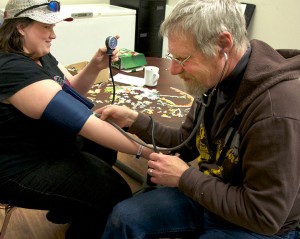Streetwise healthcare keeps Loyalist alumni busy
Brynn Campbell

BELLEVILLE, Ont. (16/02/12)— Doug Roy checks Nicole Taylor’s blood pressure at the Belleville Freedom Support Centre. Photo by Brynn Campbell.
Word on the street is, health care should be provided to everyone.
From hospitals, to a street clinic in Kingston, to the streets of Belleville, there are no limits to where street nurse Doug Roy brings his compassion and medical knowledge.
Roy, a 1985 Loyalist College nursing graduate, now labels himself as Belleville’s own street nurse.
“I had done 10 years of traditional-type nursing in the hospital, then I did nine years in a street clinic in Kingston, which I loved,” said Roy.
Meanwhile, Roy and his wife, who is also a nurse, longed to work as nurses in Third World countries. Their plans fell through once they discovered how difficult that work would be because of language barriers.
Over time, Roy came to a realization: “You don’t have to go very far to find the Third World. It is right here at home.”
“Really, health care should focus on the people in the greatest need, and that is not the case in our country,” said Roy.
“It’s the people who are usually in the greatest need who are cared for the least.
“You see a gap that needs filling and you have a set of skills and experience that can be applied so you go and fill a gap.”
About six years ago, Roy voluntarily took on the role of the Belleville street nurse. It took Roy about six months to get things figured out with the help of a few “cool people,” as Roy puts it. Eventually, Roy was capable of gaining the trust of the downtown area, and by word of mouth, clients started to appear.
“The Women’s Christian Association had heard about me, got in touch with me and offered to pay me an honorarium for doing it. We have been working together for probably six years,” said Roy.
“A street nurse is not very well-received by conventional health institutes,” said Roy. In fact, many people have a stereotypical attitude toward Roy’s clients.
“In terms of experience in working with the people downtown, there’s a lot of stereotypes. There’s the druggies; there’s the sex trade workers,” said Roy.
“So people say, ‘Isn’t that kind of dangerous?’ So we send a reply wherever I am working and say, ‘Look, I worked in the hospital for years, and was kicked, bit, spit on, punched, sworn at, on a pretty regular basis.’
“It’s never once happened on the street. Nothing even comes close to anything like that. “So that turns people’s preconceptions upside down for them.”
Roy’s role of street nurse is giving the marginalized population of downtown Belleville access to health care. Roy works closely with several agencies located downtown: The Belleville Freedom Support Centre, Salvation Army, and parks and streets downtown.
One of the many gaps Roy discovered while he working as a registered nurse was that whenever a “street person” would seek a professional for help or approach an agency, “they were often are treated as second-class citizens.”
In fact, this stigma toward street people is causing a lot more damage than people may realize, he said.
“A lot of people, because of the bad experiences with health care providers, are reluctant to present,” said Roy. “I have seen people’s illnesses get very advanced because they are avoiding the painful experiences of being rejected in an emergency room, or being treated (as) less than a complete human. That pain associated with that kind of rejection, and isolation, and stigma…has a greater impact on them than the pain of their current illness, so it’s a trade-off. So people die because of the stigma, and the fear of the pain that it brings.”
Kenny Leighton, a former support worker of the Freedom Centre, has worked closely with Roy and sees how his role is absolutely necessary.
“There is a guy alive because of Doug’s involvement,” said Leighton. “ There are people who would be homeless for sure, who would be without counselors, and without medical care, and without meds. The extra stuff that he does after, driving people to the pharmacy and things like that.
“He has had a huge impact on the street people who live downtown.”
Leighton was working at the centre when he was introduced to Roy. Leighton said he saw instantly that Roy was a good man with good intentions, and the two partnered to help the people in the area.
“With each individual, I would take them as far as I could, and then he would take them the rest of the way,” said Leighton. “He would bring people to me, so it’s been a real partnership.”
By the constant greetings and cheerful faces that Roy encounters while making his rounds downtown, it is obvious that his role has had a lot of positive impact on the streets of Belleville. Roy wants people to see the damage having a stigma towards people with addictions, mental illness, or living on the street can have.
“So addiction is a response to pain, it’s looking for comfort,” said Roy. “I don’t know anyone who is in moderate to severe pain who isn’t going to look for a way to get rid of it. Especially if it’s chronic, especially if it’s a part of the picture of your daily life, and we’ll all look for a way to get rid of it.
“And guess what? Narcotics are a really good way of getting rid of the pain. The brain doesn’t have two centers, one for emotional and one for physical pain; the brain only knows pain. And regardless of the source, pain is pain. Anything that takes pain away, becomes extremely attractive to someone who is always in pain.”
Roy works hard to help the people of downtown Belleville. He also works hard at changing the perspective that people from agencies and hospitals have toward the marginalized population.
“The dynamic is different here. I’m coming to their neighbourhood. I’m on their turf. “They won’t let me get in a tough spot, and that’s a lesson for all caring professions — marginalized people are generally hospitable when you meet them on their turf.”
 Print This Post
Print This Post






